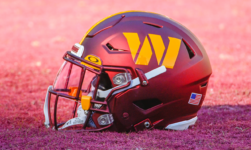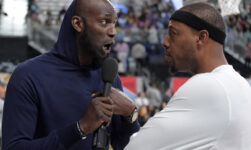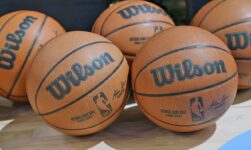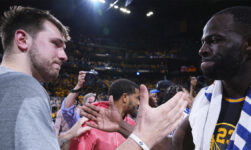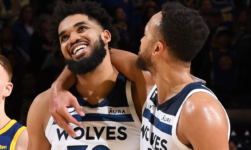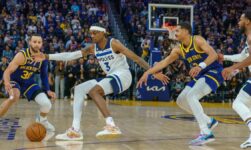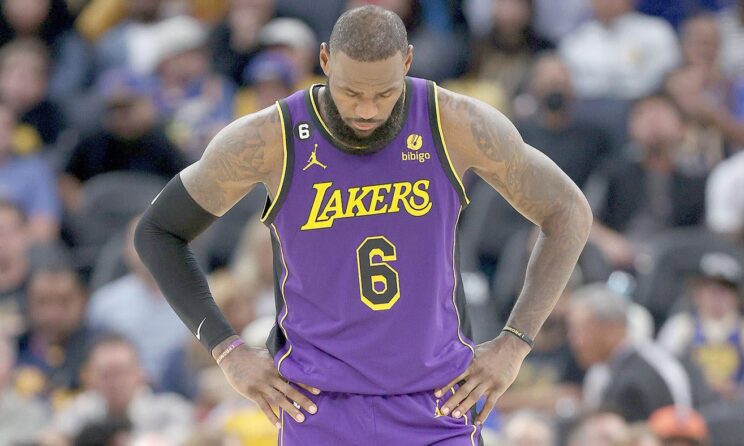
There are two problems right now for the Los Angeles Lakers. The first is how they’re currently playing. The second is what comes next.
The present is the most visible and ugly manifestation of what’s wrong in Lakerland. This team, as LeBron James has pointed out, is not “constructed of great shooting.”
That’s diplomatic, indeed. But there’s no getting around what an utter and accurate indictment LeBron’s words present to the Lakers’ roster and chances this season.
This team is 0-3. They have a stagnant and embarrassing offense, and players more likely to taunt LeBron’s supposed championship aspirations than help.
Take Anthony Davis. Though talented, he’s still an unreliable star when it comes to his health and a question mark, even when available, as a solution for a team bereft of talent. This is a roster from three to 15 that is among the worst in the NBA. And that’s before factoring in the special dumpster fire that is Russell Westbrook as a Laker.
He’s been simply awful, an albatross around a team already burdened with the expectations that always accompany LeBron but minus enough talent to remotely live up to them.
It’s bad, and things are very likely to only get worse.
It’s the future — distant though it seems for L.A. through the haze of fatigue, angst, awfulness, pessimism and mockery unfolding this season — that’s potentially most distressing.
You’re supposed to be bad post-LeBron, not while he’s still on your roster.
That’s always been the tradeoff: Compete and win now, and suffer the burnout and rebuild later. And later, like winter, is coming. LeBron will be 38 on Dec. 30. His new two-year deal is up in the summer of 2024, and despite his insanely high level of play there’s no guarantee he’ll see this Lakers team as the proper vehicle for his career’s twilight years.
During LeBron’s first stint with the Cleveland Cavaliers, they made the playoffs five consecutive seasons, including an unsuccessful Finals appearance in 2007. After he left, Cleveland went 97-215. Thirty-three wins was the high water mark. The post-LeBron principle — in which your youth, assets, draft picks and, some would argue, culture, have been sacrificed for the here and now — had begun.
The same pattern followed in Miami: Four years of greatness — back-to-back-to-back-to-back NBA Finals appearances and two rings — were the fee for a post-LeBron future that included a comedown for an organization that had only suffered one losing season in more than a decade under Pat Riley.
Yet the Heat, when LeBron returned to Cleveland, went 37-45 that first season without him, and had ups and downs before finding its footing several years later.
Same for Cleveland — Finals appearances, a long-coveted championship and then three seasons of awful basketball before general manager Koby Altman began drafting properly and turning things around.
That’s always been the deal. Having King James always comes with a price to pay, but it’s brand new territory that the price is being paid while he’s still around.
Often, LeBron’s exit forecasts that of others. In Cleveland, head coach Mike Brown and general manager Danny Ferry would move on after LeBron did. In Miami, Dwyane Wade would say goodbye to LeBron, then, eventually and awkwardly, to the Heat team he’d played for his entire career. The second time Cleveland watched LeBron exit, a familiar pattern followed. Its head coach, Ty Lue, and general manager, David Griffin, left as well.
Get LeBron. Win and win and win. Watch him leave. Lose, recalibrate, rebuild. That’s been the pattern. Until now.
The Lakers are not a good basketball team, and even with a solution for the Westbrook mess — offloading him via trade or buyout — it is unlikely this team is talented enough to do much in the way of winning this year. LeBron will probably pass Kareem as the all-time leading scorer, but that history is unlikely to be matched by similar team success.
It’s hard to see Anthony Davis as a No. 1 on a championship-level team. Most of the young talent the Lakers had accumulated pre-LeBron was traded away to get A.D. And Rob Pelinka, the GM who ultimately brought in Westbrook and built this current roster, does not instill a brimming amount of confidence as the architect of a post-LeBron future.
Yes, this Lakers season is off to a bad start in what is likely to be a bad year. But this may just be the beginning. Winning with LeBron has, until now, been the norm. But losing without him is even more of a guarantee.

